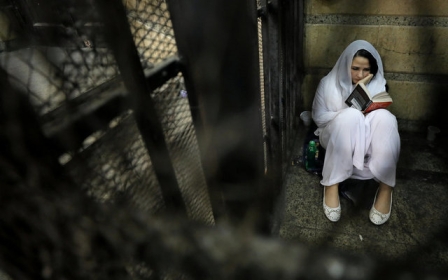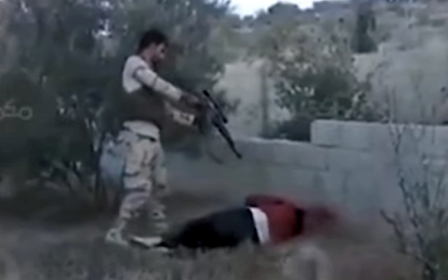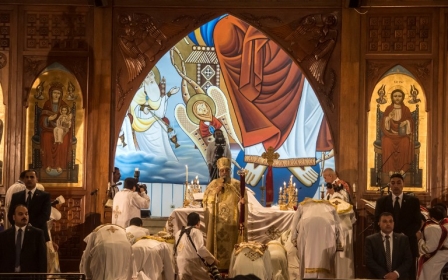Egyptian 'executions' video fuels criticism of Cairo's rights record
A gruesome video purportedly showing Egyptian soldiers killing three detainees in the restive Sinai Peninsula is fuelling criticism of human rights abuses in the country.
The video was broadcast by Mekameleen TV, an opposition news channel, on Thursday night with President Abdel Fattah al-Sisi's government already under scrutiny over its intense crackdown on dissent and free speech and the conduct of security forces battling Islamic State-linked militants in the Sinai.
The Egyptian army has not addressed the content of the footage, which appears to echo concerns raised by Human Rights Watch last month about alleged extra-judicial executions carried out by Egyptian security forces.
Most mainstream Egyptian media outlets have avoided discussing the leaks, but pro-government news website Youm7 said the three-minute clip was fabricated by the Muslim Brotherhood and Al Jazeera.
According to Youm7, the video contained several "glaring" inconsistencies. It said the soldiers in the footage were not speaking with Egyptian accents and had beards and long hair, which are banned by the army. It also said the use of mobile phones with cameras by soldiers is prohibited.
The lack of coverage of the leaked video in Egypt did not stop debate about it. #SinaiLeak was the top trending hashtag on Twitter in Egypt on Friday.
Army supporters dismissed the video as fake, largely reiterating Youm7's supposed evidence.
Others denounced the Egyptian military.
"There is no longer an army in Egypt, but gangs at the command of the leaders of the coup," wrote one user.
Ayman Nour, a former Egyptian MP, also compared the Egyptian state to a criminal gang.
"When you oppress the country because of terrorism, you are the biggest terrorist," he wrote on Twitter.
Translation: #SinaiLeak
One of the most dangerous leaks on the military’s crimes against innocent civilians in Sinai. #NotTheHead
In the video, one of the soldiers is heard telling the executioners not to shoot the victims in the head, in an apparent attempt to avoid leaving any obvious signs that they had been executed.
On 6 December, Tamer el-Refai, an Egyptian army spokesperson, posted photos showing the bodies of what he claimed were IS members killed in clashes with the Egyptian army. Activists say the pictures are of those of the executed victims in the video.
The outfit of one of the young men whose execution is shown in the video (blue jeans and a dark blue sweater) appears to match a photo in el-Refai's December post. In the photo, a machine gun appears to have been placed next to the body, to make it appear that the man was killed in combat.
"The forces of national rescue continue to raid the enclaves of terrorism in northern Sinai ... killing eight of the armed takfiri [extremist] agents by army forces and arresting four," the post read.
Human Rights Watch said on Thursday it was investigating the video.
Russian news agency Sputnik News Arabic published a story questioning the legitimacy of the footage. Similarly to Youm7, it called the leak fabricated, citing the expertise of a movie director, who argued that that soldiers were speaking with a Bedouin dialect, rather than with Egyptian accents. The director also said that the blurring of the faces of victims in the video is suspicious, although the original Mekameleen footage did not blur the faces of the victims.
The release of the clip on Thursday came hours after US Defence Secretary Jim Mattis pledged support for Sisi and the country's fight against IS during a visit to Cairo.
"I left Cairo very confident, very confident in the avenues we have to advance our military-to-military relationship, which has been a bedrock and has stood solid all these years," Mattis said after arriving in Tel Aviv on Thursday.
US President Donald Trump has made security cooperation a priority in Washington's relations with Egypt after former president Barack Obama's administration irked the Egyptian government by temporarily suspending military aid and seemingly scrutinising Cairo's human rights record.
Amnesty International had urged Trump to stress human rights when Sisi visited Washington earlier in April.
"The Trump administration cannot turn a blind eye to Egypt’s human rights crisis ... President Trump must make clear that the extent of diplomatic relations with the US depends on Egypt's willingness to address its human rights abuses," Sunjeev Bery, advocacy director at Amnesty International USA said in a statement on 31 March.
The US State Department had not responded to MEE's request for comment at the time of publication.
Middle East Eye propose une couverture et une analyse indépendantes et incomparables du Moyen-Orient, de l’Afrique du Nord et d’autres régions du monde. Pour en savoir plus sur la reprise de ce contenu et les frais qui s’appliquent, veuillez remplir ce formulaire [en anglais]. Pour en savoir plus sur MEE, cliquez ici [en anglais].




